Abstract
Cytochrome oxidase is a key enzyme in aerobic metabolism. All the recorded eubacterial (domain Bacteria) and archaebacterial (Archaea) sequences of subunits 1 and 2 of this protein complex have been used for a comprehensive evolutionary analysis. The phylogenetic trees reveal several processes of gene duplication. Some of these are ancient, having occurred in the common ancestor of Bacteria and Archaea, whereas others have occurred in specific lines of Bacteria. We show that eubacterial quinol oxidase was derived from cytochrome c oxidase in Gram-positive bacteria and that archaebacterial quinol oxidase has an independent origin. A considerable amount of evidence suggests that Proteobacteria (Purple bacteria) acquired quinol oxidase through a lateral gene transfer from Gram-positive bacteria. The prevalent hypothesis that aerobic metabolism arose several times in evolution after oxygenic photosynthesis, is not sustained by two aspects of the molecular data. First, cytochrome oxidase was present in the common ancestor of Archaea and Bacteria whereas oxygenic photosynthesis appeared in Bacteria. Second, an extant cytochrome oxidase in nitrogen-fixing bacteria shows that aerobic metabolism is possible in an environment with a very low level of oxygen, such as the root nodules of leguminous plants. Therefore, we propose that aerobic metabolism in organisms with cytochrome oxidase has a monophyletic and ancient origin, prior to the appearance of eubacterial oxygenic photosynthetic organisms.
Full text
PDF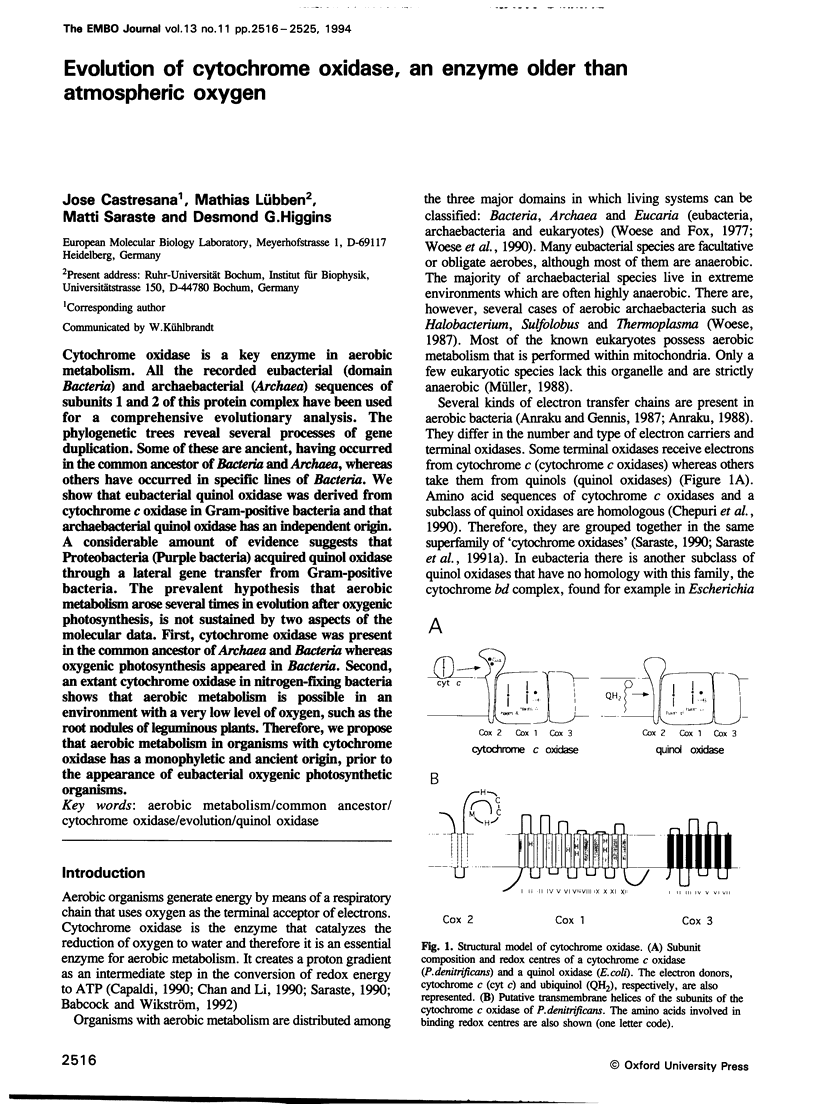
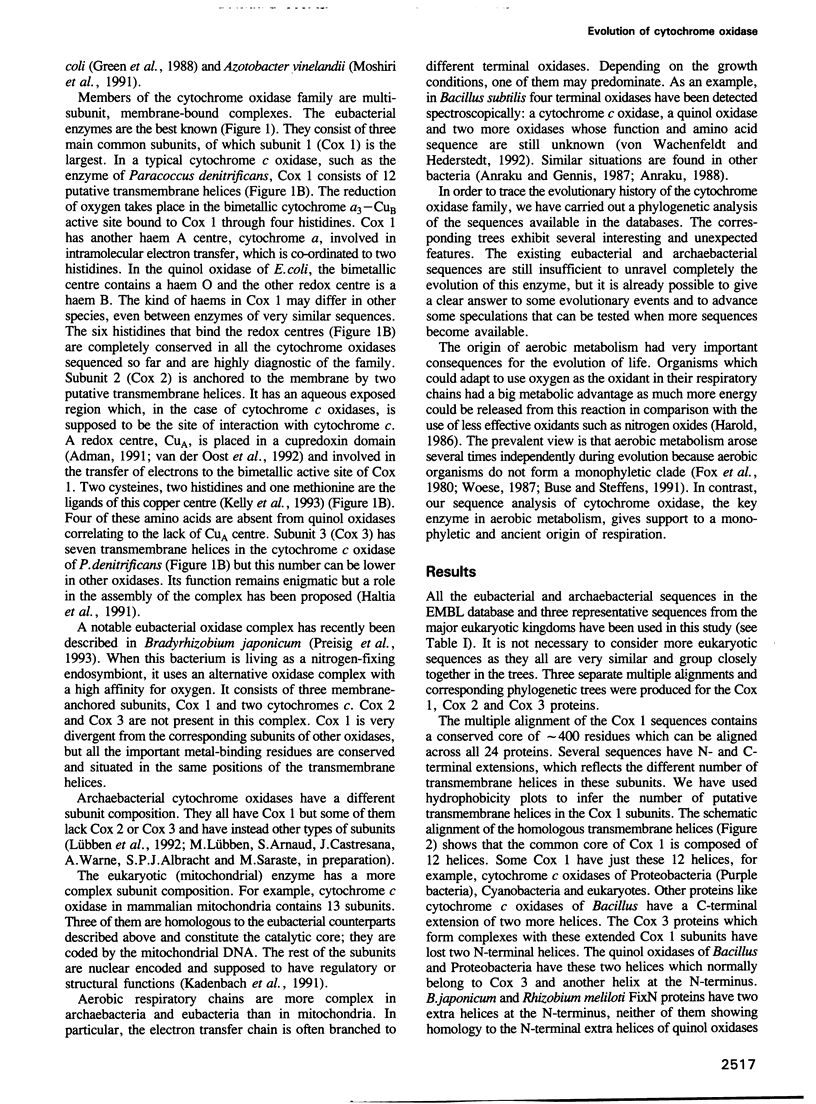
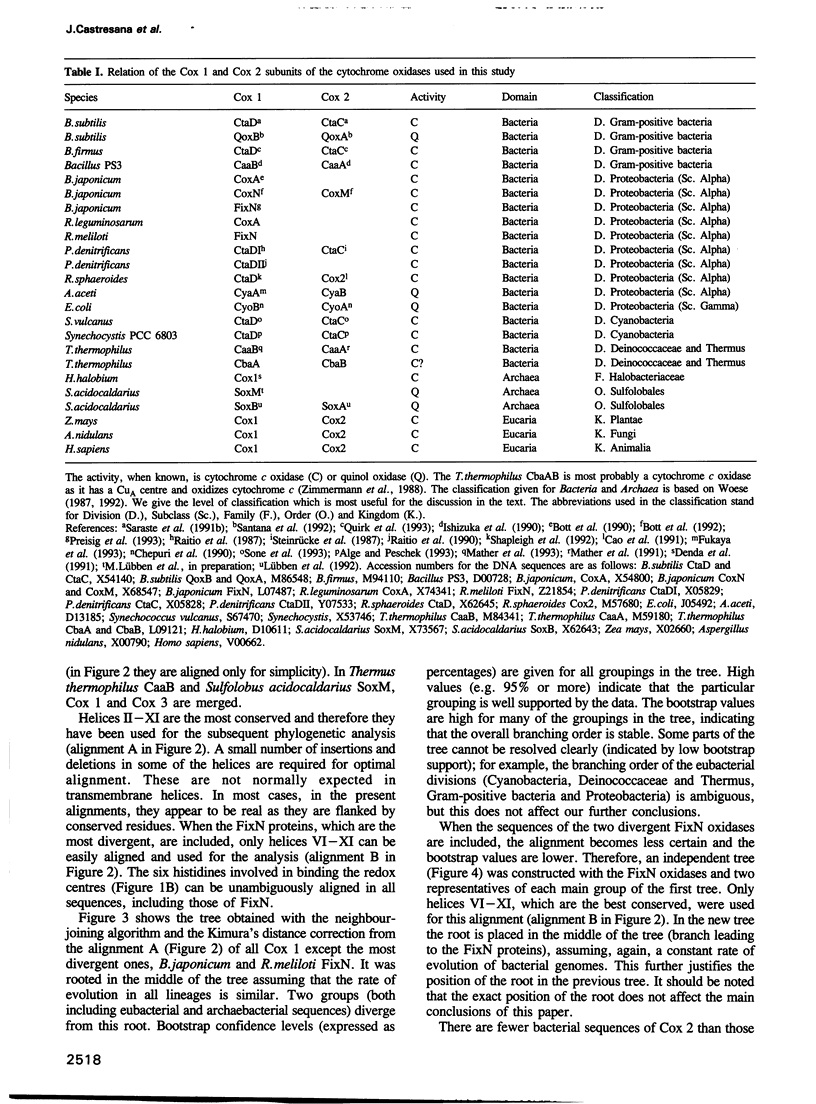
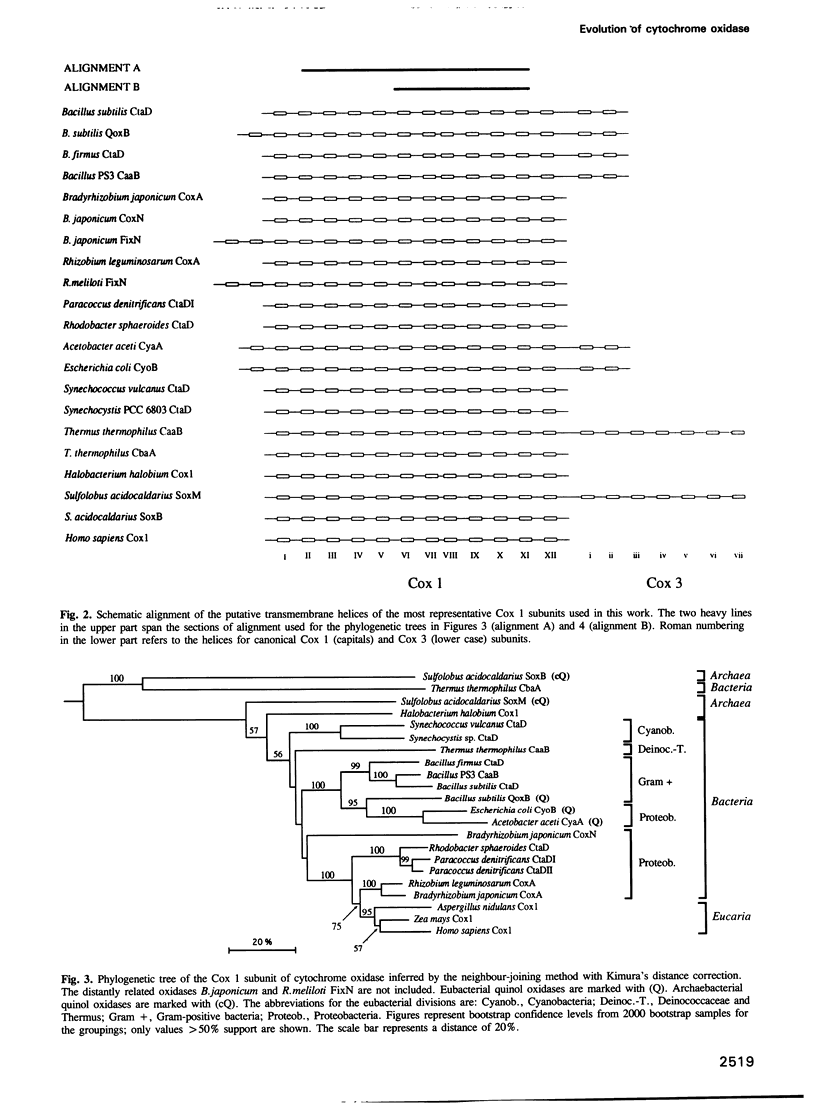
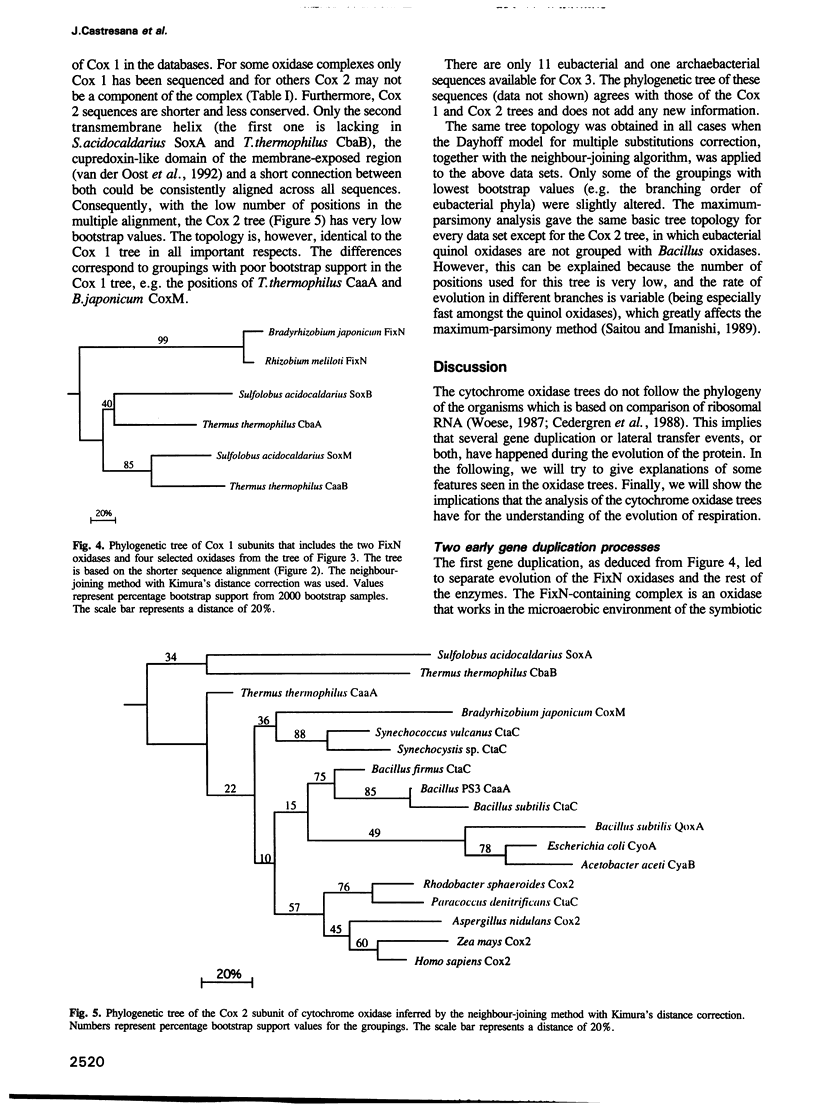
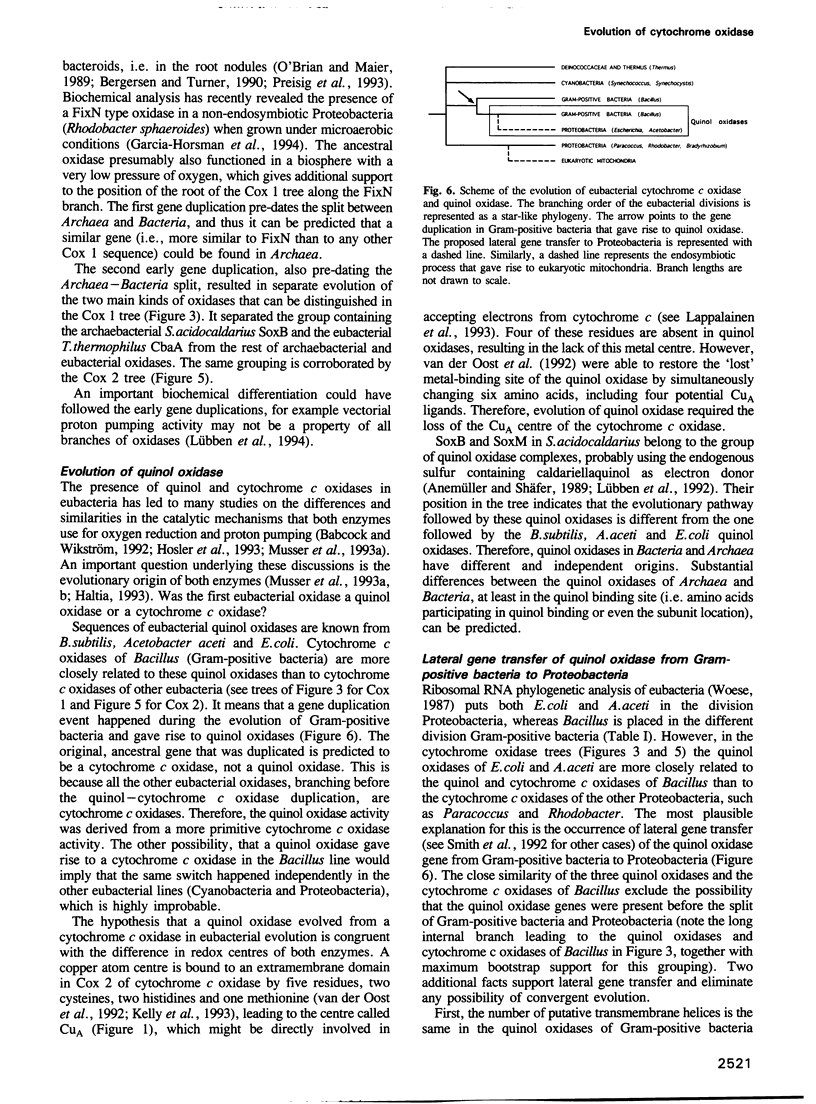
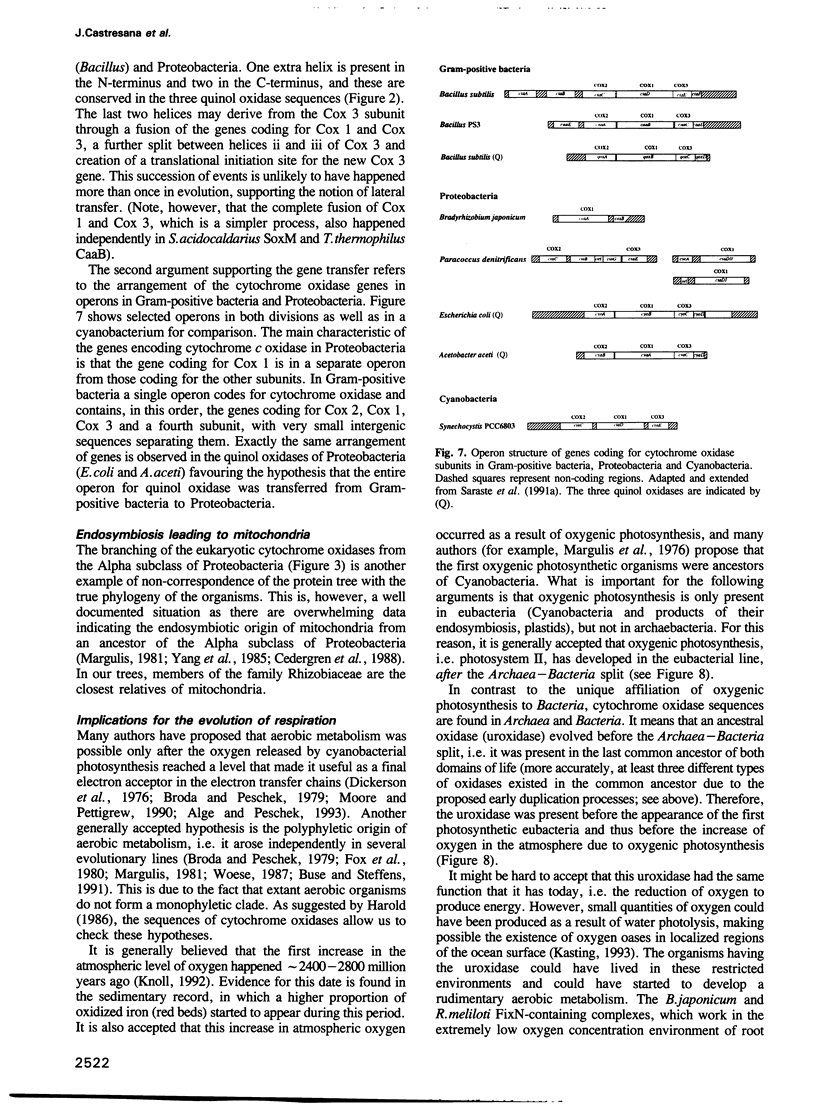
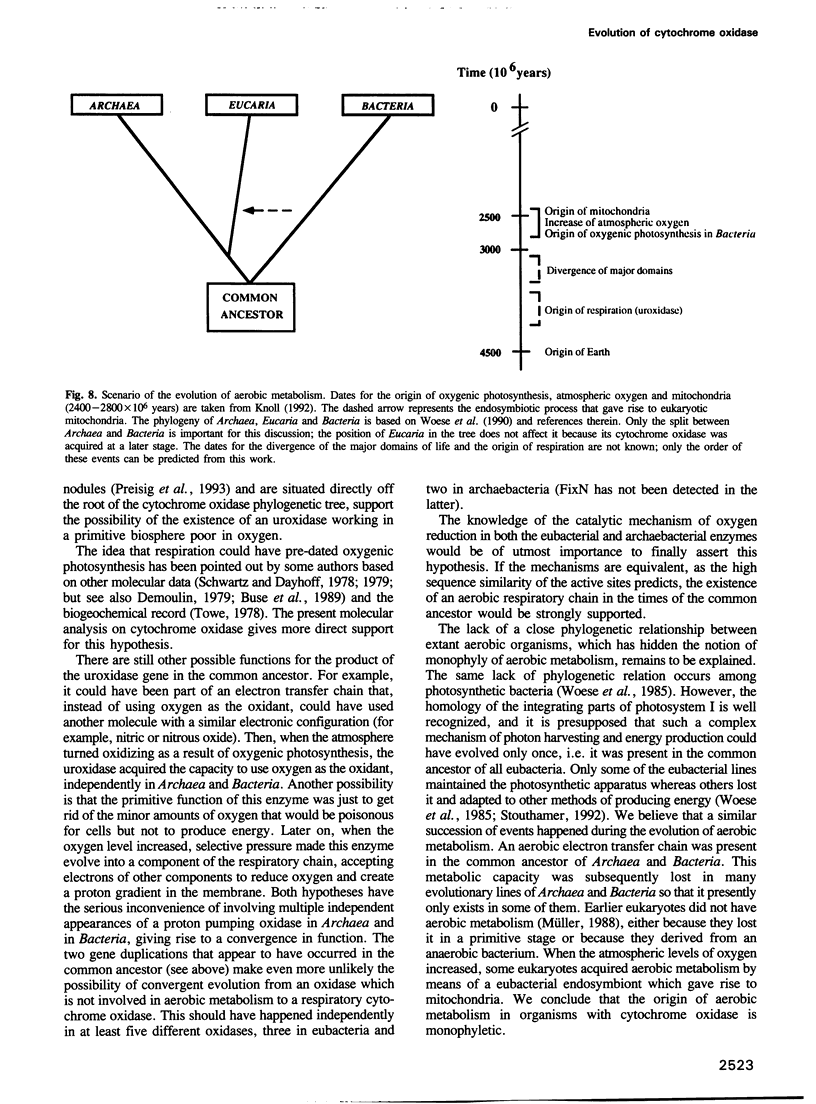
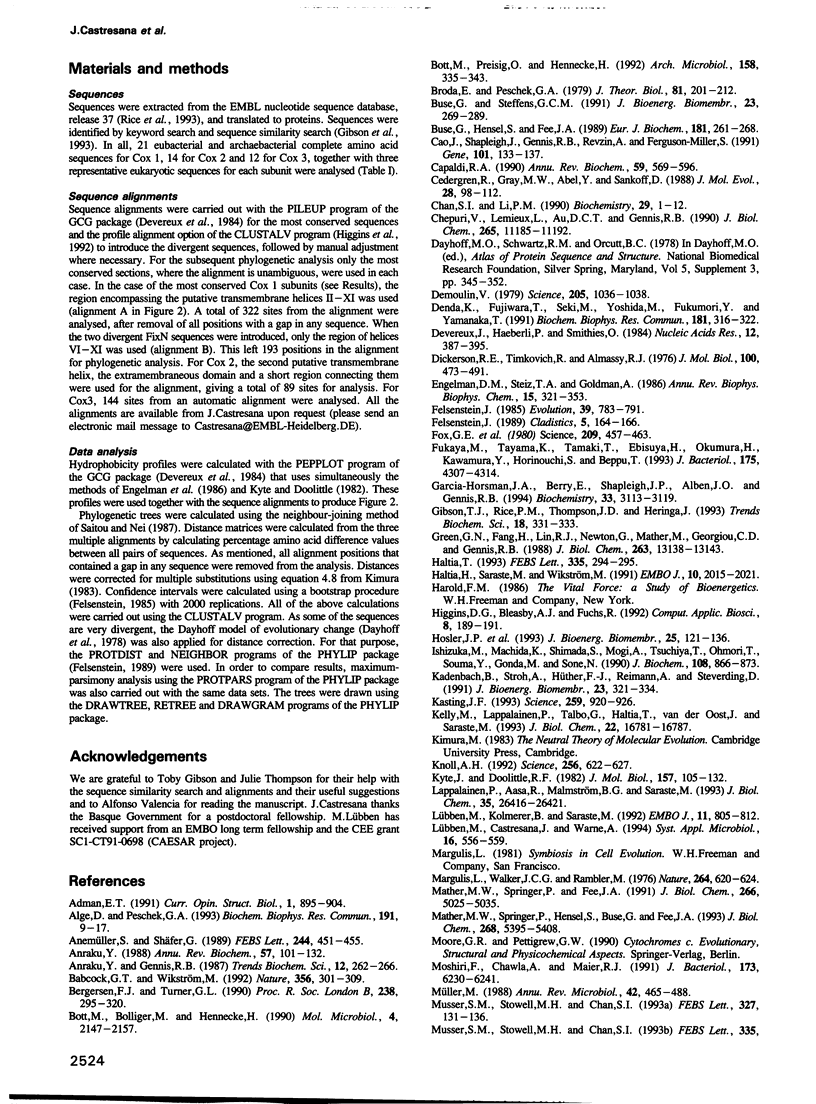
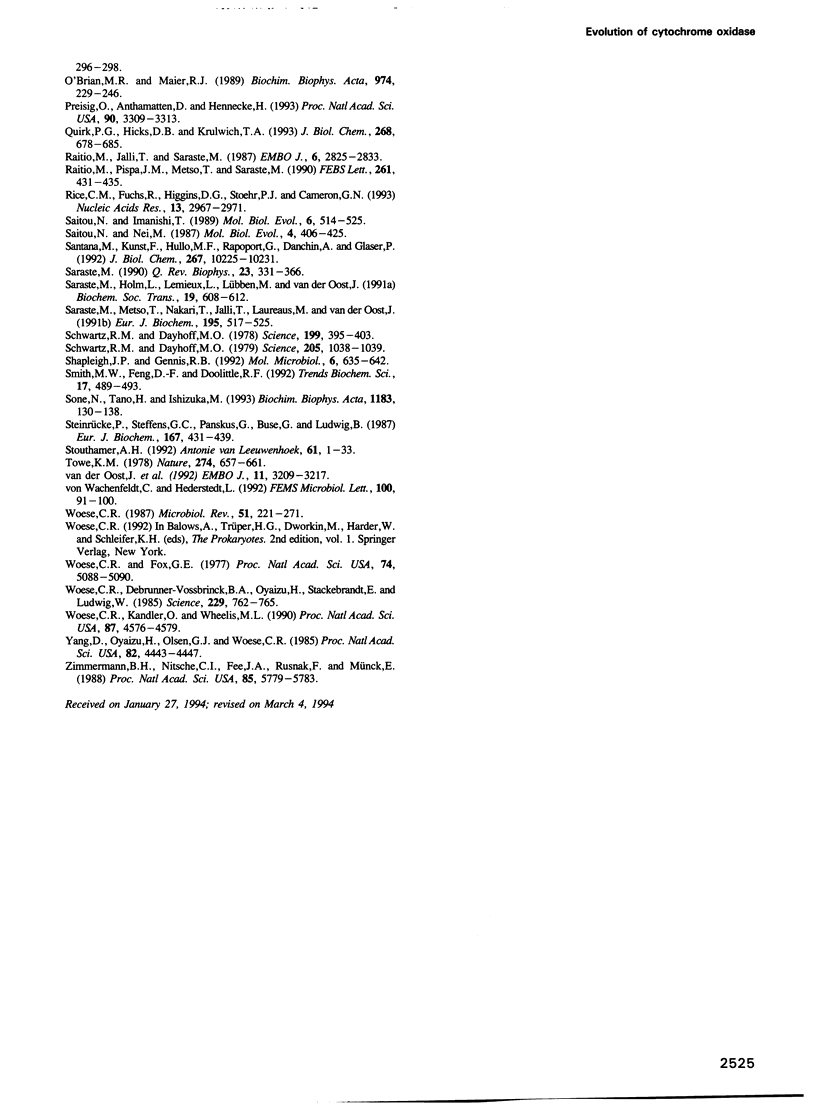
Images in this article
Selected References
These references are in PubMed. This may not be the complete list of references from this article.
- Alge D., Peschek G. A. Identification and characterization of the ctaC (coxB) gene as part of an operon encoding subunits I, II, and III of the cytochrome c oxidase (cytochrome aa3) in the cyanobacterium Synechocystis PCC 6803. Biochem Biophys Res Commun. 1993 Feb 26;191(1):9–17. doi: 10.1006/bbrc.1993.1177. [DOI] [PubMed] [Google Scholar]
- Anraku Y. Bacterial electron transport chains. Annu Rev Biochem. 1988;57:101–132. doi: 10.1146/annurev.bi.57.070188.000533. [DOI] [PubMed] [Google Scholar]
- Babcock G. T., Wikström M. Oxygen activation and the conservation of energy in cell respiration. Nature. 1992 Mar 26;356(6367):301–309. doi: 10.1038/356301a0. [DOI] [PubMed] [Google Scholar]
- Bott M., Bolliger M., Hennecke H. Genetic analysis of the cytochrome c-aa3 branch of the Bradyrhizobium japonicum respiratory chain. Mol Microbiol. 1990 Dec;4(12):2147–2157. doi: 10.1111/j.1365-2958.1990.tb00576.x. [DOI] [PubMed] [Google Scholar]
- Bott M., Preisig O., Hennecke H. Genes for a second terminal oxidase in Bradyrhizobium japonicum. Arch Microbiol. 1992;158(5):335–343. doi: 10.1007/BF00245362. [DOI] [PubMed] [Google Scholar]
- Broda E., Peschek G. A. Did respiration or photosynthesis come first? J Theor Biol. 1979 Nov 21;81(2):201–212. doi: 10.1016/0022-5193(79)90160-7. [DOI] [PubMed] [Google Scholar]
- Buse G., Hensel S., Fee J. A. Evidence for cytochrome oxidase subunit I and a cytochrome c--subunit II fused protein in the cytochrome 'c1aa3' of Thermus thermophilus. How old is cytochrome oxidase? Eur J Biochem. 1989 Apr 15;181(1):261–268. doi: 10.1111/j.1432-1033.1989.tb14720.x. [DOI] [PubMed] [Google Scholar]
- Buse G., Steffens G. C. Cytochrome c oxidase in Paracoccus denitrificans. Protein, chemical, structural, and evolutionary aspects. J Bioenerg Biomembr. 1991 Apr;23(2):269–289. doi: 10.1007/BF00762222. [DOI] [PubMed] [Google Scholar]
- Cao J., Shapleigh J., Gennis R., Revzin A., Ferguson-Miller S. The gene encoding cytochrome c oxidase subunit II from Rhodobacter sphaeroides; comparison of the deduced amino acid sequence with sequences of corresponding peptides from other species. Gene. 1991 May 15;101(1):133–137. doi: 10.1016/0378-1119(91)90235-4. [DOI] [PubMed] [Google Scholar]
- Capaldi R. A. Structure and function of cytochrome c oxidase. Annu Rev Biochem. 1990;59:569–596. doi: 10.1146/annurev.bi.59.070190.003033. [DOI] [PubMed] [Google Scholar]
- Cedergren R., Gray M. W., Abel Y., Sankoff D. The evolutionary relationships among known life forms. J Mol Evol. 1988 Dec;28(1-2):98–112. doi: 10.1007/BF02143501. [DOI] [PubMed] [Google Scholar]
- Chan S. I., Li P. M. Cytochrome c oxidase: understanding nature's design of a proton pump. Biochemistry. 1990 Jan 9;29(1):1–12. doi: 10.1021/bi00453a001. [DOI] [PubMed] [Google Scholar]
- Chepuri V., Lemieux L., Au D. C., Gennis R. B. The sequence of the cyo operon indicates substantial structural similarities between the cytochrome o ubiquinol oxidase of Escherichia coli and the aa3-type family of cytochrome c oxidases. J Biol Chem. 1990 Jul 5;265(19):11185–11192. [PubMed] [Google Scholar]
- Demoulin V. Protein and nucleic acid sequence data and phylogeny. Science. 1979 Sep 7;205(4410):1036–1039. doi: 10.1126/science.472727. [DOI] [PubMed] [Google Scholar]
- Denda K., Fujiwara T., Seki M., Yoshida M., Fukumori Y., Yamanaka T. Molecular cloning of the cytochrome aa3 gene from the archaeon (Archaebacterium) Halobacterium halobium. Biochem Biophys Res Commun. 1991 Nov 27;181(1):316–322. doi: 10.1016/s0006-291x(05)81420-2. [DOI] [PubMed] [Google Scholar]
- Devereux J., Haeberli P., Smithies O. A comprehensive set of sequence analysis programs for the VAX. Nucleic Acids Res. 1984 Jan 11;12(1 Pt 1):387–395. doi: 10.1093/nar/12.1part1.387. [DOI] [PMC free article] [PubMed] [Google Scholar]
- Dickerson R. E., Timkovich R., Almassy R. J. The cytochrome fold and the evolution of bacterial energy metabolism. J Mol Biol. 1976 Feb 5;100(4):473–491. doi: 10.1016/s0022-2836(76)80041-1. [DOI] [PubMed] [Google Scholar]
- Engelman D. M., Steitz T. A., Goldman A. Identifying nonpolar transbilayer helices in amino acid sequences of membrane proteins. Annu Rev Biophys Biophys Chem. 1986;15:321–353. doi: 10.1146/annurev.bb.15.060186.001541. [DOI] [PubMed] [Google Scholar]
- Fox G. E., Stackebrandt E., Hespell R. B., Gibson J., Maniloff J., Dyer T. A., Wolfe R. S., Balch W. E., Tanner R. S., Magrum L. J. The phylogeny of prokaryotes. Science. 1980 Jul 25;209(4455):457–463. doi: 10.1126/science.6771870. [DOI] [PubMed] [Google Scholar]
- Fukaya M., Tayama K., Tamaki T., Ebisuya H., Okumura H., Kawamura Y., Horinouchi S., Beppu T. Characterization of a cytochrome a1 that functions as a ubiquinol oxidase in Acetobacter aceti. J Bacteriol. 1993 Jul;175(14):4307–4314. doi: 10.1128/jb.175.14.4307-4314.1993. [DOI] [PMC free article] [PubMed] [Google Scholar]
- García-Horsman J. A., Berry E., Shapleigh J. P., Alben J. O., Gennis R. B. A novel cytochrome c oxidase from Rhodobacter sphaeroides that lacks CuA. Biochemistry. 1994 Mar 15;33(10):3113–3119. doi: 10.1021/bi00176a046. [DOI] [PubMed] [Google Scholar]
- Gibson T. J., Rice P. M., Thompson J. D., Heringa J. KH domains within the FMR1 sequence suggest that fragile X syndrome stems from a defect in RNA metabolism. Trends Biochem Sci. 1993 Sep;18(9):331–333. doi: 10.1016/0968-0004(93)90068-x. [DOI] [PubMed] [Google Scholar]
- Green G. N., Fang H., Lin R. J., Newton G., Mather M., Georgiou C. D., Gennis R. B. The nucleotide sequence of the cyd locus encoding the two subunits of the cytochrome d terminal oxidase complex of Escherichia coli. J Biol Chem. 1988 Sep 15;263(26):13138–13143. [PubMed] [Google Scholar]
- Haltia T., Saraste M., Wikström M. Subunit III of cytochrome c oxidase is not involved in proton translocation: a site-directed mutagenesis study. EMBO J. 1991 Aug;10(8):2015–2021. doi: 10.1002/j.1460-2075.1991.tb07731.x. [DOI] [PMC free article] [PubMed] [Google Scholar]
- Haltia T. The similarity of cytochrome c and ubiquinol oxidases. FEBS Lett. 1993 Dec 6;335(2):294–295. doi: 10.1016/0014-5793(93)80750-o. [DOI] [PubMed] [Google Scholar]
- Higgins D. G., Bleasby A. J., Fuchs R. CLUSTAL V: improved software for multiple sequence alignment. Comput Appl Biosci. 1992 Apr;8(2):189–191. doi: 10.1093/bioinformatics/8.2.189. [DOI] [PubMed] [Google Scholar]
- Hosler J. P., Ferguson-Miller S., Calhoun M. W., Thomas J. W., Hill J., Lemieux L., Ma J., Georgiou C., Fetter J., Shapleigh J. Insight into the active-site structure and function of cytochrome oxidase by analysis of site-directed mutants of bacterial cytochrome aa3 and cytochrome bo. J Bioenerg Biomembr. 1993 Apr;25(2):121–136. doi: 10.1007/BF00762854. [DOI] [PubMed] [Google Scholar]
- Ishizuka M., Machida K., Shimada S., Mogi A., Tsuchiya T., Ohmori T., Souma Y., Gonda M., Sone N. Nucleotide sequence of the gene coding for four subunits of cytochrome c oxidase from the thermophilic bacterium PS3. J Biochem. 1990 Nov;108(5):866–873. doi: 10.1093/oxfordjournals.jbchem.a123294. [DOI] [PubMed] [Google Scholar]
- Kadenbach B., Stroh A., Hüther F. J., Reimann A., Steverding D. Evolutionary aspects of cytochrome c oxidase. J Bioenerg Biomembr. 1991 Apr;23(2):321–334. doi: 10.1007/BF00762225. [DOI] [PubMed] [Google Scholar]
- Kasting J. F. Earth's early atmosphere. Science. 1993 Feb 12;259(5097):920–926. doi: 10.1126/science.11536547. [DOI] [PubMed] [Google Scholar]
- Kelly M., Lappalainen P., Talbo G., Haltia T., van der Oost J., Saraste M. Two cysteines, two histidines, and one methionine are ligands of a binuclear purple copper center. J Biol Chem. 1993 Aug 5;268(22):16781–16787. [PubMed] [Google Scholar]
- Knoll A. H. The early evolution of eukaryotes: a geological perspective. Science. 1992 May 1;256(5057):622–627. doi: 10.1126/science.1585174. [DOI] [PubMed] [Google Scholar]
- Kyte J., Doolittle R. F. A simple method for displaying the hydropathic character of a protein. J Mol Biol. 1982 May 5;157(1):105–132. doi: 10.1016/0022-2836(82)90515-0. [DOI] [PubMed] [Google Scholar]
- Lappalainen P., Aasa R., Malmström B. G., Saraste M. Soluble CuA-binding domain from the Paracoccus cytochrome c oxidase. J Biol Chem. 1993 Dec 15;268(35):26416–26421. [PubMed] [Google Scholar]
- Lübben M., Kolmerer B., Saraste M. An archaebacterial terminal oxidase combines core structures of two mitochondrial respiratory complexes. EMBO J. 1992 Mar;11(3):805–812. doi: 10.1002/j.1460-2075.1992.tb05117.x. [DOI] [PMC free article] [PubMed] [Google Scholar]
- Mather M. W., Springer P., Fee J. A. Cytochrome oxidase genes from Thermus thermophilus. Nucleotide sequence and analysis of the deduced primary structure of subunit IIc of cytochrome caa3. J Biol Chem. 1991 Mar 15;266(8):5025–5035. [PubMed] [Google Scholar]
- Mather M. W., Springer P., Hensel S., Buse G., Fee J. A. Cytochrome oxidase genes from Thermus thermophilus. Nucleotide sequence of the fused gene and analysis of the deduced primary structures for subunits I and III of cytochrome caa3. J Biol Chem. 1993 Mar 15;268(8):5395–5408. [PubMed] [Google Scholar]
- Moshiri F., Chawla A., Maier R. J. Cloning, characterization, and expression in Escherichia coli of the genes encoding the cytochrome d oxidase complex from Azotobacter vinelandii. J Bacteriol. 1991 Oct;173(19):6230–6241. doi: 10.1128/jb.173.19.6230-6241.1991. [DOI] [PMC free article] [PubMed] [Google Scholar]
- Musser S. M., Stowell M. H., Chan S. I. Comparison of ubiquinol and cytochrome c terminal oxidases. An alternative view. FEBS Lett. 1993 Jul 26;327(2):131–136. doi: 10.1016/0014-5793(93)80156-o. [DOI] [PubMed] [Google Scholar]
- Müller M. Energy metabolism of protozoa without mitochondria. Annu Rev Microbiol. 1988;42:465–488. doi: 10.1146/annurev.mi.42.100188.002341. [DOI] [PubMed] [Google Scholar]
- O'Brian M. R., Maier R. J. Molecular aspects of the energetics of nitrogen fixation in Rhizobium-legume symbioses. Biochim Biophys Acta. 1989 May 30;974(3):229–246. doi: 10.1016/s0005-2728(89)80239-7. [DOI] [PubMed] [Google Scholar]
- Preisig O., Anthamatten D., Hennecke H. Genes for a microaerobically induced oxidase complex in Bradyrhizobium japonicum are essential for a nitrogen-fixing endosymbiosis. Proc Natl Acad Sci U S A. 1993 Apr 15;90(8):3309–3313. doi: 10.1073/pnas.90.8.3309. [DOI] [PMC free article] [PubMed] [Google Scholar]
- Quirk P. G., Hicks D. B., Krulwich T. A. Cloning of the cta operon from alkaliphilic Bacillus firmus OF4 and characterization of the pH-regulated cytochrome caa3 oxidase it encodes. J Biol Chem. 1993 Jan 5;268(1):678–685. [PubMed] [Google Scholar]
- Raitio M., Jalli T., Saraste M. Isolation and analysis of the genes for cytochrome c oxidase in Paracoccus denitrificans. EMBO J. 1987 Sep;6(9):2825–2833. doi: 10.1002/j.1460-2075.1987.tb02579.x. [DOI] [PMC free article] [PubMed] [Google Scholar]
- Raitio M., Pispa J. M., Metso T., Saraste M. Are there isoenzymes of cytochrome c oxidase in Paracoccus denitrificans? FEBS Lett. 1990 Feb 26;261(2):431–435. doi: 10.1016/0014-5793(90)80609-m. [DOI] [PubMed] [Google Scholar]
- Rice C. M., Fuchs R., Higgins D. G., Stoehr P. J., Cameron G. N. The EMBL data library. Nucleic Acids Res. 1993 Jul 1;21(13):2967–2971. doi: 10.1093/nar/21.13.2967. [DOI] [PMC free article] [PubMed] [Google Scholar]
- Saitou N., Nei M. The neighbor-joining method: a new method for reconstructing phylogenetic trees. Mol Biol Evol. 1987 Jul;4(4):406–425. doi: 10.1093/oxfordjournals.molbev.a040454. [DOI] [PubMed] [Google Scholar]
- Santana M., Kunst F., Hullo M. F., Rapoport G., Danchin A., Glaser P. Molecular cloning, sequencing, and physiological characterization of the qox operon from Bacillus subtilis encoding the aa3-600 quinol oxidase. J Biol Chem. 1992 May 25;267(15):10225–10231. [PubMed] [Google Scholar]
- Saraste M., Holm L., Lemieux L., Lübben M., van der Oost J. The happy family of cytochrome oxidases. Biochem Soc Trans. 1991 Aug;19(3):608–612. doi: 10.1042/bst0190608. [DOI] [PubMed] [Google Scholar]
- Saraste M., Metso T., Nakari T., Jalli T., Lauraeus M., Van der Oost J. The Bacillus subtilis cytochrome-c oxidase. Variations on a conserved protein theme. Eur J Biochem. 1991 Jan 30;195(2):517–525. doi: 10.1111/j.1432-1033.1991.tb15732.x. [DOI] [PubMed] [Google Scholar]
- Saraste M. Structural features of cytochrome oxidase. Q Rev Biophys. 1990 Nov;23(4):331–366. doi: 10.1017/s0033583500005588. [DOI] [PubMed] [Google Scholar]
- Schwartz R. M., Dayhoff M. O. Origins of prokaryotes, eukaryotes, mitochondria, and chloroplasts. Science. 1978 Jan 27;199(4327):395–403. doi: 10.1126/science.202030. [DOI] [PubMed] [Google Scholar]
- Schwartz R. M., Dayhoff M. O. Protein and nucleic Acid sequence data and phylogeny. Science. 1979 Sep 7;205(4410):1038–1039. doi: 10.1126/science.205.4410.1038. [DOI] [PubMed] [Google Scholar]
- Shapleigh J. P., Gennis R. B. Cloning, sequencing and deletion from the chromosome of the gene encoding subunit I of the aa3-type cytochrome c oxidase of Rhodobacter sphaeroides. Mol Microbiol. 1992 Mar;6(5):635–642. doi: 10.1111/j.1365-2958.1992.tb01511.x. [DOI] [PubMed] [Google Scholar]
- Smith M. W., Feng D. F., Doolittle R. F. Evolution by acquisition: the case for horizontal gene transfers. Trends Biochem Sci. 1992 Dec;17(12):489–493. doi: 10.1016/0968-0004(92)90335-7. [DOI] [PubMed] [Google Scholar]
- Sone N., Tano H., Ishizuka M. The genes in the thermophilic cyanobacterium Synechococcus vulcanus encoding cytochrome-c oxidase. Biochim Biophys Acta. 1993 Nov 2;1183(1):130–138. doi: 10.1016/0005-2728(93)90012-5. [DOI] [PubMed] [Google Scholar]
- Steinrücke P., Steffens G. C., Panskus G., Buse G., Ludwig B. Subunit II of cytochrome c oxidase from Paracoccus denitrificans. DNA sequence, gene expression and the protein. Eur J Biochem. 1987 Sep 15;167(3):431–439. doi: 10.1111/j.1432-1033.1987.tb13356.x. [DOI] [PubMed] [Google Scholar]
- Stouthamer A. H. Metabolic pathways in Paracoccus denitrificans and closely related bacteria in relation to the phylogeny of prokaryotes. Antonie Van Leeuwenhoek. 1992 Jan;61(1):1–33. doi: 10.1007/BF00572119. [DOI] [PubMed] [Google Scholar]
- Woese C. R. Bacterial evolution. Microbiol Rev. 1987 Jun;51(2):221–271. doi: 10.1128/mr.51.2.221-271.1987. [DOI] [PMC free article] [PubMed] [Google Scholar]
- Woese C. R., Debrunner-Vossbrinck B. A., Oyaizu H., Stackebrandt E., Ludwig W. Gram-positive bacteria: possible photosynthetic ancestry. Science. 1985;229:762–765. doi: 10.1126/science.11539659. [DOI] [PubMed] [Google Scholar]
- Woese C. R., Fox G. E. Phylogenetic structure of the prokaryotic domain: the primary kingdoms. Proc Natl Acad Sci U S A. 1977 Nov;74(11):5088–5090. doi: 10.1073/pnas.74.11.5088. [DOI] [PMC free article] [PubMed] [Google Scholar]
- Woese C. R., Kandler O., Wheelis M. L. Towards a natural system of organisms: proposal for the domains Archaea, Bacteria, and Eucarya. Proc Natl Acad Sci U S A. 1990 Jun;87(12):4576–4579. doi: 10.1073/pnas.87.12.4576. [DOI] [PMC free article] [PubMed] [Google Scholar]
- Yang D., Oyaizu Y., Oyaizu H., Olsen G. J., Woese C. R. Mitochondrial origins. Proc Natl Acad Sci U S A. 1985 Jul;82(13):4443–4447. doi: 10.1073/pnas.82.13.4443. [DOI] [PMC free article] [PubMed] [Google Scholar]
- Zimmermann B. H., Nitsche C. I., Fee J. A., Rusnak F., Münck E. Properties of a copper-containing cytochrome ba3: a second terminal oxidase from the extreme thermophile Thermus thermophilus. Proc Natl Acad Sci U S A. 1988 Aug;85(16):5779–5783. doi: 10.1073/pnas.85.16.5779. [DOI] [PMC free article] [PubMed] [Google Scholar]
- van der Oost J., Lappalainen P., Musacchio A., Warne A., Lemieux L., Rumbley J., Gennis R. B., Aasa R., Pascher T., Malmström B. G. Restoration of a lost metal-binding site: construction of two different copper sites into a subunit of the E. coli cytochrome o quinol oxidase complex. EMBO J. 1992 Sep;11(9):3209–3217. doi: 10.1002/j.1460-2075.1992.tb05398.x. [DOI] [PMC free article] [PubMed] [Google Scholar]
- von Wachenfeldt C., Hederstedt L. Molecular biology of Bacillus subtilis cytochromes. FEMS Microbiol Lett. 1992 Dec 15;100(1-3):91–100. doi: 10.1111/j.1574-6968.1992.tb14025.x. [DOI] [PubMed] [Google Scholar]



